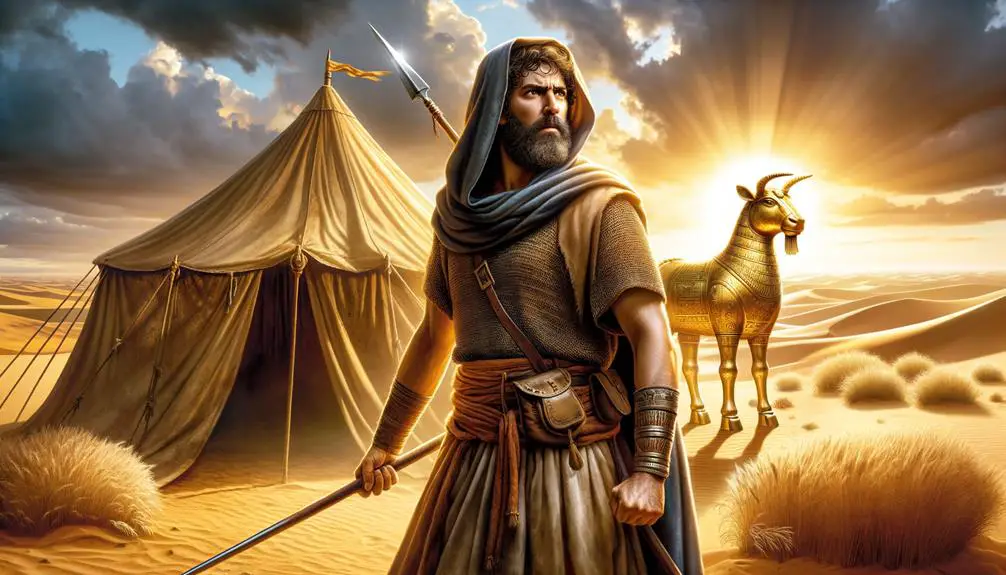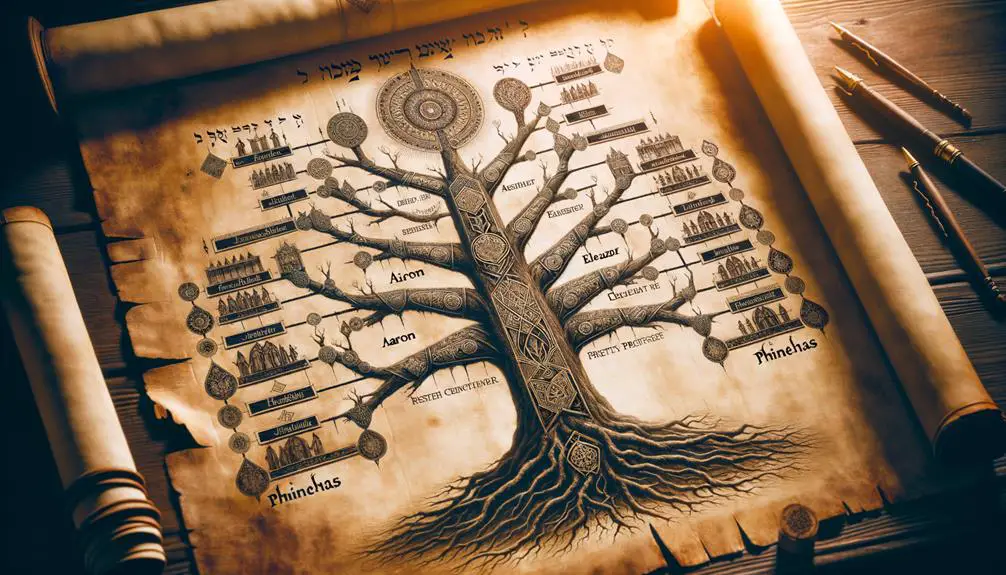Explore the enigmatic figure of Phinehas in the Bible, whose zeal against idolatry sparks divine favor and a covenant of peace.

Who Is Phinehas in the Bible
In the tapestry of biblical narratives, Phinehas stands out as a vibrant thread, symbolizing zeal and divine favor. You'll find him within the pages of the Book of Numbers, where his actions at Peor mark a turning point for the Israelites.
As a descendant of Aaron, his lineage is notable, but it's his zealous act against idolatry and immorality that cements his legacy, earning him a covenant of peace from God himself. His story raises intriguing questions about zeal, justice, and the fine line between righteousness and fanaticism.
To grasp the full complexity of Phinehas's character and his impact on both historical and modern interpretations, you'll need to explore beyond the surface.
Key Takeaways
- Phinehas is a direct descendant of Aaron, emphasizing his significant role in the Levitical priesthood.
- He intervened zealously at Peor, restoring covenantal allegiance among the Israelites.
- His actions led to the granting of a divine covenant of peace, symbolizing divine favor.
- Phinehas's legacy is explored through various interpretations in Jewish and Christian traditions.
The Lineage of Phinehas

Who was Phinehas in the intricate tapestry of biblical ancestry, and what sets his lineage apart? Phinehas stands as a figure entwined with a rich priestly heritage, stemming directly from Aaron's descent. His lineage isn't merely a footnote in the annals of religious history but a pivotal chapter that underscores the continuity and sanctity of the priestly office within the Israelite community. The significance of Phinehas's genealogy goes beyond mere familial connections; it's a testament to the perpetuation of a sacred vocation, handed down through generations, from Aaron, the first high priest, to his descendants.
Delving into the lineage, you'll find that Phinehas is the grandson of Aaron, through his son Eleazar. This connection places him squarely within the Levitical priesthood, a lineage characterized by its unique role in religious rites, sacrifices, and mediation between the divine and the Israelites. The priestly heritage, as embodied by Phinehas, is marked by a profound commitment to upholding the laws and rituals ordained by their faith—a duty that encompasses both spiritual leadership and societal governance.
The distinctiveness of Aaron's descent, with its emphasis on purity, devotion, and service, thus forms the bedrock of Phinehas's identity and mission. His lineage isn't just a lineage of blood; it's a lineage of purpose, charged with maintaining the holiness of the covenant community. In this light, Phinehas's role isn't solely defined by his priestly functions; it's also shaped by the legacy of leadership, moral integrity, and divine service bequeathed to him by his forebears.
The Incident at Peor
You'll find the Incident at Peor pivotal in understanding the complexities of Israel's history with idolatry.
It's here that Phinehas's zealous act against the idolaters marks a significant turning point, highlighting the tension between faithfulness and apostasy.
This event's aftermath and consequences shed light on the broader implications of religious zeal and community cohesion in ancient Israel.
Peor's Idolatry Crisis
The incident at Peor, a pivotal moment in biblical history, highlights a severe crisis of idolatry among the Israelites, challenging their covenantal fidelity. This episode sheds light on the origins of idolatry within the community and stresses the urgency for a resolution to restore their commitment to the divine covenant.
- The crisis emerged from the Israelites' engagement with Moabite cultic practices.
- Idolatry origins can be traced back to the influence of local pagan worship.
- The event underscored a significant breach of the Israelites' covenant with God.
- It prompted an immediate need for crisis resolution to realign the community's spiritual compass.
- The incident at Peor served as a critical juncture, testing the Israelites' devotion and adherence to divine commandments.
Phinehas's Zealous Act
In light of the profound idolatry crisis at Peor, it was Phinehas's decisive intervention that underscored a critical turning point for the Israelite community's covenantal allegiance.
His actions, driven by zealous motivations, directly confronted the blatant disregard for divine commandments exhibited by some Israelites and their Moabite influences.
Phinehas's response to this crisis wasn't merely an act of personal conviction but a manifestation of his deep commitment to uphold the sanctity of the covenant between God and Israel.
This zealous act garnered divine approval, marking him as a pivotal figure whose courage reestablished the moral and religious order among the Israelites.
His intervention, therefore, isn't just a historical footnote but a moment of profound theological significance, illustrating the complex interplay between divine command, human agency, and the quest for communal purity.
Aftermath and Consequences
Following Phinehas's zealous intervention, the Israelite community faced a period of profound reflection and reevaluation of their covenantal commitments. This incident at Peor not only halted a plague but also underscored the ethical implications of leadership qualities within a religious context.
- The community grappled with the ethical implications of zealotry versus tolerance.
- Phinehas's actions highlighted the importance of decisive leadership in times of communal transgression.
- There was an increased emphasis on fidelity to covenantal laws, reinforcing communal identity.
- The incident sparked discussions on the balance between divine justice and mercy.
- It served as a precedent for future leaders, emphasizing the necessity of upholding moral and religious principles.
This analysis indicates that Phinehas's act was a catalyst for significant socio-religious transformation within the Israelite community.
Phinehas's Zealous Act
One of the most pivotal moments in Phinehas's narrative is his zealous act of intervening in a public display of idolatry and immorality, which significantly impacted the Israelites' relationship with their covenant obligations. This act isn't merely a moment of personal conviction but a critical juncture that underlines the fierce loyalty to Yahweh expected of the Israelites. Phinehas's zealous motives stem from a deep-seated reverence for the divine laws that govern his community. His actions, while extreme, are framed within the context of a society grappling with the temptations of surrounding cultures and the dire consequences of straying from their covenant with God.
The divine approval Phinehas receives for his actions is a key aspect of this narrative, emphasizing the gravity of his intervention. It's not merely the act itself but the intent and the purity of his zealotry that garner commendation from God. This divine endorsement serves as a powerful affirmation of the values upheld by the Israelite community and the lengths to which individuals must go to protect the sanctity of their covenant with Yahweh.
Phinehas's intervention thus serves as a stark reminder of the consequences of idolatry and immorality, reinforcing the boundaries that define the Israelite identity. His actions, driven by zealous motives, receive divine approval, underscoring the intricate balance between divine commandments and human agency in maintaining the sanctity of the covenant. This episode in Phinehas's life not only marks a decisive moment in the biblical narrative but also offers profound insights into the dynamics of faith, obedience, and zeal in the face of moral and spiritual decay.
The Covenant of Peace

After Phinehas's zealous act received divine approval, a significant development unfolded: the granting of a covenant of peace. This covenant, bestowed upon Phinehas by the divine, underscores a pivotal moment in biblical narratives, emphasizing the gravity and significance of his actions. The covenant of peace isn't merely a reward but a symbolically rich assurance of divine favor and an enduring priestly lineage. Its implications are profound, reflecting both on the character of Phinehas and the theological contours of biblical covenants.
The covenant of peace with Phinehas incorporates several key elements:
- Peace symbolism: It signifies not just the cessation of conflict but also represents a harmonious relationship between the divine and Phinehas's descendants. This peace is both internal and communal, highlighting a state of divine grace.
- Covenant significance: The covenant underscores the notion of commitment and divine promise, reinforcing the sacred bond between God and those who act righteously.
- Perpetual priesthood: The covenant ensures that Phinehas's lineage will continue the priestly role, establishing a direct line of spiritual leadership.
- Divine approval: The covenant acts as a divine endorsement of Phinehas's actions, legitimizing zeal in the defense of faith as worthy of divine reward.
- Moral precedent: It sets a moral and spiritual precedent, illustrating the rewards of zealousness and fidelity to divine commandments.
Analyzing the covenant of peace reveals its multifaceted significance, from peace symbolism to its role in shaping the priestly lineage. It's not just a personal reward but a foundational moment that reverberates with theological and moral implications.
Phinehas in Later Texts
You'll find that Phinehas' legacy extends beyond the Hebrew Bible, particularly into Rabbinic interpretations and Christian writings.
Scholars have scrutinized how these later texts either uphold or reinterpret Phinehas' actions and the covenant of peace awarded to him.
This exploration sheds light on the evolving perceptions of Phinehas' character and his moral and religious significance in Jewish and Christian traditions.
Rabbinic Interpretations Explored
Rabbinic texts delve deeply into Phinehas's actions, exploring their implications and the lessons derived for Jewish thought and law. They scrutinize Phinehas's character and the consequences of zealotry, offering nuanced perspectives that resonate through centuries.
- Contextual Analysis: Rabbinic interpretations provide context, showing how Phinehas's zealotry was both a response to and a catalyst for change.
- Moral Implications: They ponder the moral ramifications of his actions within the community.
- Legal Precedents: His deed sets legal precedents regarding zealot actions in Jewish law.
- Divine Approval: The texts explore the significance of divine approval and covenant granted to Phinehas.
- Legacy and Lessons: Finally, they extract lessons on leadership, justice, and the complexity of moral decisions from his story.
Phinehas in Christian Writings
Exploring the portrayal of Phinehas in Christian texts reveals a continuation and transformation of his legacy, shedding light on his impact beyond Jewish tradition. Phinehas's priesthood is often interpreted within Christian symbolism as a precursor to Christ's eternal priesthood. This connection highlights a deep layer of typology, where Phinehas's zealous actions for God's covenant anticipate the sacrificial love of Christ.
Aspect |
Interpretation |
|---|---|
Phinehas's Zeal |
Foreshadows Christ's zeal for His church. |
Eternal Covenant |
Prefigures the New Covenant in Christ. |
Intercessory Role |
Mirrors Christ's intercession for humanity. |
Priesthood |
Symbolizes the eternal priesthood of Christ. |
This analytical approach invites you to see Phinehas not merely as a historical figure, but as a profound precursor to key Christian themes, enriching the tapestry of biblical narratives with layers of meaning and foresight.
The Legacy of Phinehas

The legacy of Phinehas in biblical history is marked by his zealous actions, which have been interpreted through various lenses over the centuries. Central to understanding his impact are Phinehas's leadership and his profound religious zeal. These elements not only defined his role within the narratives of the Hebrew Bible but also influenced later religious and moral discussions.
Phinehas's actions, driven by an intense commitment to his faith, showcase a leadership style that prioritizes religious principles above all. This unwavering dedication to the preservation of religious purity and community standards has made Phinehas a figure of considerable discussion and analysis. His legacy is multifaceted, encompassing aspects of:
- Phinehas's leadership: Demonstrating a model of leadership that's both decisive and rooted in religious conviction.
- Religious zeal: His actions are a prime example of the lengths to which religious zeal can motivate individuals to act.
- Covenantal rewards: The biblical narrative rewards Phinehas with a covenant of peace and a lasting priesthood, emphasizing the value placed on zealotry within the text.
- Institutional implications: Phinehas's actions have been interpreted as setting a precedent for religious and moral authority within a community.
- Historical and theological debates: His legacy has sparked discussions regarding the balance between religious fervor and ethical conduct.
Analyzing Phinehas's legacy requires a consideration of these complex elements, which have contributed to his lasting significance in religious scholarship. His story serves as a pivotal point for discussions on leadership, zeal, and the implications of both for religious communities.
Moral and Religious Interpretations
Having examined Phinehas's legacy, it's crucial to now consider how his actions have been interpreted through moral and religious lenses. Throughout history, scholars and theologians have debated the ethical dilemmas and zealotry critique inherent in Phinehas's story. This analysis delves into these complex interpretations, offering insight into how different perspectives shape our understanding of his character and actions.
Aspect |
Ethical Evaluation |
Religious Interpretation |
|---|---|---|
Zealotry |
Often criticized for extreme actions. |
Viewed as a divine zeal, sanctioned by God. |
Ethical Dilemmas |
Raises questions about moral absolutism vs. situational ethics. |
Seen as choosing divine command over personal morality. |
Leadership |
Actions spark debate on the role of leaders in moral crises. |
Considered a model of leadership willing to enforce divine law. |
Legacy |
Controversial; seen as both a hero and a figure of divisiveness. |
Honored for preventing Israel's decline into idolatry and immorality. |
Through this lens, Phinehas's story is a rich tapestry of moral and religious debates. The ethical dilemmas he faced underscore the tension between the demands of faith and the complexities of human morality. Meanwhile, the critique of zealotry invites reflection on the limits of religious fervor and the consequences of actions taken in its name. Analyzing Phinehas's actions from these perspectives not only enriches our understanding of his story but also illuminates broader themes in ethical and religious thought.
Frequently Asked Questions
How Does the Story of Phinehas Relate to Modern-Day Ethical Dilemmas?
You're exploring how ancient narratives like Phinehas' story intersect with modern ethical debates, notably between ethical absolutism and cultural relativism.
This analysis demonstrates that dilemmas faced in historical contexts can mirror contemporary ethical challenges, urging a reevaluation of moral absolutes versus cultural norms.
Your inquiry underscores the relevance of historical ethical frameworks in addressing today's moral quandaries, highlighting the ongoing dialogue between past precedents and present dilemmas.
Are There Any Archaeological Findings That Support the Existence or the Deeds of Phinehas?
You're probably wondering if there's any tangible evidence out there, like Phinehas artifacts, to back up the stories you've heard.
Well, so far, archaeological digs haven't turned up direct artifacts linked to Phinehas or his specific deeds. However, scholars often find objects that draw strong Biblical parallels, helping us understand the era's culture and practices.
These findings, while not directly confirming Phinehas' actions, provide a broader context for interpreting historical and religious narratives.
How Has Phinehas Been Depicted in Visual Arts or Literature Throughout History?
Throughout history, Phinehas's zeal has been 'enthusiastically immortalized' in various forms of art and literature. When exploring Phinehas iconography, you come across a spectrum of interpretations, from stark, dramatic visual representations to more nuanced, symbolic art pieces.
Literary adaptations, on the other hand, delve into the complexities of his actions, often portraying him with a depth that challenges or reaffirms traditional perspectives. This scholarly journey reveals how his legacy has been continuously reinterpreted.
What Are the Differences in the Portrayal of Phinehas Between Various Religious Traditions or Denominations?
You'll find that Phinehas' lineage and clerical interpretations significantly shape his portrayal across various religious traditions or denominations. Differences often emerge from the emphasis placed on his genealogy and the moral lessons drawn from his actions, reflecting each tradition's doctrinal nuances.
Scholars analyze these portrayals to understand how communities view zealotry and priesthood, revealing a spectrum of interpretations that range from commendation to cautionary tales, depending on the theological lens applied.
How Do Contemporary Scholars Critique or Reinterpret the Actions of Phinehas in Light of Modern Values and Human Rights?
You'll find that contemporary scholars often critique or reinterpret the actions of historical figures through modern interpretive lenses, focusing on moral absolutism and human rights. They question the traditional narratives, pushing for a reevaluation in light of today's ethical standards.
This approach sheds new light on actions previously seen in one dimension, urging a deeper understanding and, at times, a reassessment of their moral implications within the context of contemporary values.
Conclusion
In analyzing the narrative of Phinehas, you uncover a figure emblematic of zeal and divine favor. Interestingly, despite the brevity of his story, Phinehas's actions led to a covenant of peace affecting generations, underscoring the weight of moral decisiveness in biblical history.
The fact that his lineage, as per biblical accounts, continued to serve in high priestly roles for centuries speaks volumes, evidencing a lasting legacy rooted in a single, fervent act. This statistic not only evokes emotion but also highlights the profound impact of individual actions within a broader religious and moral framework, showcasing the intricate interplay between divine favor, zeal, and leadership across generations.



Sign up